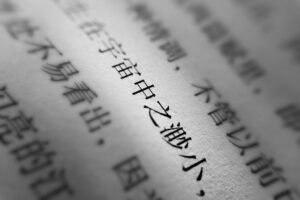China is a country with a rich cultural heritage that spans thousands of years. From its ancient dynasties to its modern-day society, China has been shaped by a multitude of factors, including its language and literature. Ancient Chinese phrases hold great importance in shaping the country’s history and culture, as they provide insights into the values, beliefs, and wisdom of the Chinese people.
Table of Contents
ToggleThe Art of Living: Embracing the Concept of Tao
One of the most significant concepts in Chinese philosophy is Tao, which can be translated as “the way” or “the path.” Tao represents the natural order of the universe and encompasses the principles of balance, harmony, and flow. It encourages individuals to live in accordance with nature and to embrace simplicity and spontaneity.
To apply the concept of Tao in daily life, one must learn to let go of attachments and desires, and instead focus on being present in the moment. This involves accepting things as they are and not trying to control or manipulate outcomes. By embracing the concept of Tao, individuals can find peace and contentment in their lives.
The Power of Yin and Yang: Balancing Opposites in Life
The concept of Yin and Yang is another fundamental principle in Chinese philosophy. Yin represents darkness, femininity, passivity, and coldness, while Yang represents light, masculinity, activity, and warmth. These two opposing forces are interconnected and interdependent, and they exist in a state of constant flux.
To achieve balance in life, it is important to embrace both Yin and Yang. This means recognizing that life is filled with ups and downs, joy and sorrow, success and failure. By accepting these dualities and finding harmony between them, individuals can lead more fulfilling lives.
The Virtue of Patience: Learning from the Bamboo
| Metrics | Data |
|---|---|
| Height of Bamboo | Up to 30 meters |
| Time to Grow | 3-5 years |
| Strength | Stronger than oak |
| Flexibility | Can bend up to 90 degrees without breaking |
| Symbolism | Patience, resilience, adaptability |
In Chinese culture, bamboo holds great symbolism and is often associated with the virtue of patience. Bamboo is a resilient plant that takes years to grow and reach its full potential. It teaches us the importance of perseverance and the value of patience in achieving our goals.
Like bamboo, we must learn to be patient and trust in the process of growth. Success does not happen overnight, and it requires dedication, hard work, and time. By embracing the virtue of patience, we can overcome obstacles and achieve our dreams.
The Art of War: Applying Sun Tzu’s Principles in Daily Life
Sun Tzu’s book, “The Art of War,” is a renowned ancient Chinese text that provides insights into military strategy and tactics. However, its principles can also be applied to various aspects of daily life, such as business, relationships, and personal development.
One of the key teachings from “The Art of War” is the importance of knowing oneself and one’s strengths and weaknesses. By understanding ourselves, we can make better decisions and navigate challenges more effectively. Additionally, the book emphasizes the importance of adaptability and flexibility in order to overcome obstacles and achieve success.
The Beauty of Simplicity: Appreciating the Wisdom of Lao Tzu
Lao Tzu was an ancient Chinese philosopher who is best known for his book, “Tao Te Ching.” His teachings emphasize the value of simplicity, humility, and living in harmony with nature.
Lao Tzu encourages individuals to let go of material possessions and desires, as they can lead to dissatisfaction and unhappiness. Instead, he suggests focusing on inner peace and contentment by embracing simplicity in all aspects of life.
The Importance of Harmony: Embracing the Concept of Feng Shui
Feng Shui is an ancient Chinese practice that focuses on creating harmony and balance in one’s environment. It involves arranging furniture, objects, and spaces in a way that promotes positive energy flow and enhances well-being.
The concept of Feng Shui is based on the belief that our surroundings have a profound impact on our physical, mental, and emotional well-being. By creating a harmonious environment, individuals can cultivate a sense of peace and tranquility in their lives.
The Value of Education: A Journey of a Thousand Miles Begins with a Single Step
Education holds great importance in Chinese culture, as it is seen as a means of personal growth and development. The Chinese proverb, “A journey of a thousand miles begins with a single step,” emphasizes the value of taking small, consistent actions towards achieving one’s goals.
To cultivate a lifelong love of learning, it is important to approach education with curiosity and an open mind. This involves seeking out new knowledge, challenging oneself intellectually, and embracing opportunities for growth and self-improvement.
The Importance of Family: Honouring One’s Ancestors and Elders
Family plays a central role in Chinese culture, and the concept of filial piety is highly valued. Filial piety refers to the respect, obedience, and care that individuals are expected to show towards their parents and elders.
Honouring one’s ancestors and elders involves paying tribute to their wisdom, sacrifices, and contributions. This can be done through rituals, such as ancestor worship and family gatherings, as well as through acts of kindness and support.
The Art of Communication: Understanding the Beauty of Chinese Proverbs and Idioms
Chinese proverbs and idioms are an integral part of the language and culture. They are concise expressions that convey deeper meanings and insights into life.
Using Chinese proverbs and idioms in communication can enhance understanding and convey complex ideas in a succinct manner. They provide a unique perspective on various aspects of life, such as love, friendship, success, and happiness.
Ancient Chinese phrases hold great importance in shaping Chinese culture and provide valuable insights into the wisdom and values of the Chinese people. By embracing concepts such as Tao, Yin and Yang, patience, and simplicity, individuals can lead more fulfilling lives. Additionally, practices such as Feng Shui, filial piety, and the use of Chinese proverbs and idioms can enhance well-being and communication. By applying these teachings in daily life, individuals can cultivate personal growth and development.
Check out this fascinating article on the LC Chinese School website about ancient Chinese phrases. It explores the rich history and cultural significance of these phrases, providing insights into their origins and meanings. From personal pronouns to discussing addresses, this article covers a wide range of topics related to ancient Chinese language. Whether you’re a beginner or an advanced learner, this article is a valuable resource for anyone interested in delving deeper into the intricacies of Chinese language and culture. Read more








